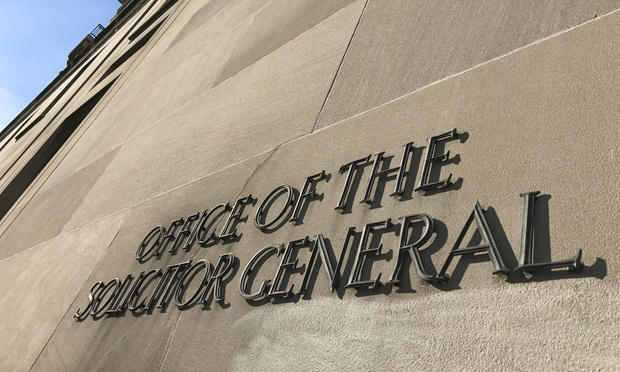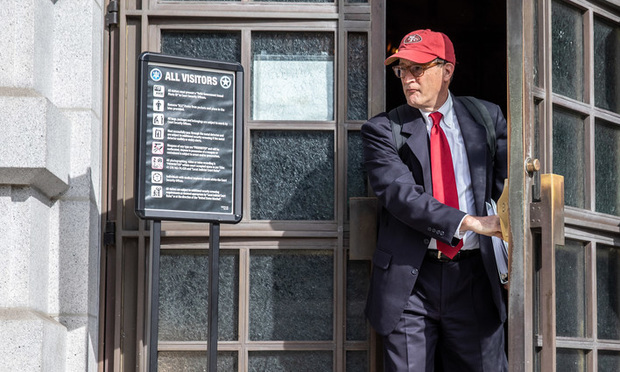Justices, Ruling for Trump's DOJ, Won't Rush Obamacare Case for This Term
The justices' decision on timing makes it unlikely the high court will hear and issue a decision on the health insurance law before the November presidential election.
January 21, 2020 at 09:52 AM
4 minute read
 U.S. solicitor general's office, Washington, D.C. (Photo: Mike Scarcella/ ALM)
U.S. solicitor general's office, Washington, D.C. (Photo: Mike Scarcella/ ALM)
The U.S. Supreme Court on Tuesday refused to speed up its review of the constitutionality of the Affordable Care Act, rejecting requests by the U.S. House and a coalition of Democratic-led states that wanted the court to hear the dispute this term as the Trump administration and a host of Republican-led states move to dismantle the law.
The justices' decision on timing makes it unlikely the high court will hear and issue a decision on the health insurance law before the November presidential election. The Trump administration's Justice Department had argued that there was no rush to consider the law's fate, a potentially politically divisive issue for the Republican Party and more broadly the 2020 election.
The court, without comment, denied requests by the U.S. House and a coalition of 16 Democratic-led states that wanted the justices to expedite their review of a decision last month by the U.S. Court of Appeals for the Fifth Circuit. A divided panel ruled that the individual mandate to purchase health insurance—which the Supreme Court upheld in 2012 as a constitutional tax—was no longer constitutional because Congress in 2017 zeroed out the tax penalty for failure to have insurance.
The panel decision largely affirmed a ruling in December 2018 by U.S. District Judge Reed O'Connor in Texas. But the appellate panel sent back to O'Connor the question of whether Congress intended other provisions of the law to remain operable. O'Connor had earlier decided that the mandate was so central to the law that the entire law must fall.
If the entire Affordable Care Act is unconstitutional, as argued by the Trump administration's Justice Department and the Republican coalition, the law's insurance coverage would end for an estimated 20 million people, including protection for people with preexisting conditions, the Medicaid expansion in many states, coverage for young persons up to age 26 on their parents' plans, subsidies for low-income people and a host of other wide-ranging changes.
 Douglas Letter, general counsel to the U.S. House of Representatives, Washington, D.C. (Photo: Jason Doiy/ALM)
Douglas Letter, general counsel to the U.S. House of Representatives, Washington, D.C. (Photo: Jason Doiy/ALM)The Fifth Circuit's decision "poses a severe, immediate, and ongoing threat to the orderly operation of healthcare markets throughout the country, casts doubt over whether millions of individuals will continue to be able to afford vitally important care, and leaves a critical sector of the nation's economy in unacceptable limbo," House general counsel Douglas Letter told the justices. Letter is assisted by Munger, Tolles & Olson partner Donald Verrilli Jr. and Elizabeth Wydra of the Constitutional Accountability Center.
But U.S. Solicitor General Noel Francisco countered in his response that the Fifth Circuit's decision did not "definitively" resolve any question of practical significance.
The appeals panel, Francisco told the justices, sent the case back to the district court to determine whether the mandate and other provisions could be severed from the law. The House's reason for speeding up proceedings, Francisco wrote, "at bottom, is that the vitality of the ACA's myriad provisions is too important to be left unresolved. But definitive resolution of that issue will be facilitated, not frustrated, by allowing the lower courts to complete their own consideration of the question."
The Justice Department argued initially that only those provisions closely tied to the mandate—for example, the requirement to sell coverage to people with preexisting conditions and not to charge them more—should be struck down with the mandate. But when ACA defenders appealed, the administration changed its position to support the GOP challengers' argument that the entire law must fall.
The justices on Friday did agree to hear another Obamacare case, taking up a dispute over a Trump administration rule expanding the types of employers who can claim religious exemptions from providing contraceptive coverage. A decision in that case is expected by June.
Read more:
On Obamacare, Trump's DOJ Tells Supreme Court There's No Rush
Donald Verrilli Returns to SCOTUS to Defend Obamacare
How Clarence Thomas Starred in Fifth Circuit's Ruling Against Obamacare
5th Circuit Strikes Gibson Dunn's Pro-Obamacare Brief Over Recusal Issue
'Embarrassingly Bad,' 'Unmoored': Legal Scholars Bash Texas Judge's ACA Takedown
This content has been archived. It is available through our partners, LexisNexis® and Bloomberg Law.
To view this content, please continue to their sites.
Not a Lexis Subscriber?
Subscribe Now
Not a Bloomberg Law Subscriber?
Subscribe Now
NOT FOR REPRINT
© 2025 ALM Global, LLC, All Rights Reserved. Request academic re-use from www.copyright.com. All other uses, submit a request to [email protected]. For more information visit Asset & Logo Licensing.
You Might Like
View All

'A Warning Shot to Board Rooms': DOJ Decision to Fight $14B Tech Merger May Be Bad Omen for Industry

'Incredibly Complicated'? Antitrust Litigators Identify Pros and Cons of Proposed One Agency Act
5 minute readTrending Stories
- 1An Eye on ‘De-Risking’: Chewing on Hot Topics in Litigation Funding With Jeffery Lula of GLS Capital
- 2Arguing Class Actions: With Friends Like These...
- 3How Some Elite Law Firms Are Growing Equity Partner Ranks Faster Than Others
- 4Fried Frank Partner Leaves for Paul Hastings to Start Tech Transactions Practice
- 5Stradley Ronon Welcomes Insurance Team From Mintz
Who Got The Work
J. Brugh Lower of Gibbons has entered an appearance for industrial equipment supplier Devco Corporation in a pending trademark infringement lawsuit. The suit, accusing the defendant of selling knock-off Graco products, was filed Dec. 18 in New Jersey District Court by Rivkin Radler on behalf of Graco Inc. and Graco Minnesota. The case, assigned to U.S. District Judge Zahid N. Quraishi, is 3:24-cv-11294, Graco Inc. et al v. Devco Corporation.
Who Got The Work
Rebecca Maller-Stein and Kent A. Yalowitz of Arnold & Porter Kaye Scholer have entered their appearances for Hanaco Venture Capital and its executives, Lior Prosor and David Frankel, in a pending securities lawsuit. The action, filed on Dec. 24 in New York Southern District Court by Zell, Aron & Co. on behalf of Goldeneye Advisors, accuses the defendants of negligently and fraudulently managing the plaintiff's $1 million investment. The case, assigned to U.S. District Judge Vernon S. Broderick, is 1:24-cv-09918, Goldeneye Advisors, LLC v. Hanaco Venture Capital, Ltd. et al.
Who Got The Work
Attorneys from A&O Shearman has stepped in as defense counsel for Toronto-Dominion Bank and other defendants in a pending securities class action. The suit, filed Dec. 11 in New York Southern District Court by Bleichmar Fonti & Auld, accuses the defendants of concealing the bank's 'pervasive' deficiencies in regards to its compliance with the Bank Secrecy Act and the quality of its anti-money laundering controls. The case, assigned to U.S. District Judge Arun Subramanian, is 1:24-cv-09445, Gonzalez v. The Toronto-Dominion Bank et al.
Who Got The Work
Crown Castle International, a Pennsylvania company providing shared communications infrastructure, has turned to Luke D. Wolf of Gordon Rees Scully Mansukhani to fend off a pending breach-of-contract lawsuit. The court action, filed Nov. 25 in Michigan Eastern District Court by Hooper Hathaway PC on behalf of The Town Residences LLC, accuses Crown Castle of failing to transfer approximately $30,000 in utility payments from T-Mobile in breach of a roof-top lease and assignment agreement. The case, assigned to U.S. District Judge Susan K. Declercq, is 2:24-cv-13131, The Town Residences LLC v. T-Mobile US, Inc. et al.
Who Got The Work
Wilfred P. Coronato and Daniel M. Schwartz of McCarter & English have stepped in as defense counsel to Electrolux Home Products Inc. in a pending product liability lawsuit. The court action, filed Nov. 26 in New York Eastern District Court by Poulos Lopiccolo PC and Nagel Rice LLP on behalf of David Stern, alleges that the defendant's refrigerators’ drawers and shelving repeatedly break and fall apart within months after purchase. The case, assigned to U.S. District Judge Joan M. Azrack, is 2:24-cv-08204, Stern v. Electrolux Home Products, Inc.
Featured Firms
Law Offices of Gary Martin Hays & Associates, P.C.
(470) 294-1674
Law Offices of Mark E. Salomone
(857) 444-6468
Smith & Hassler
(713) 739-1250









